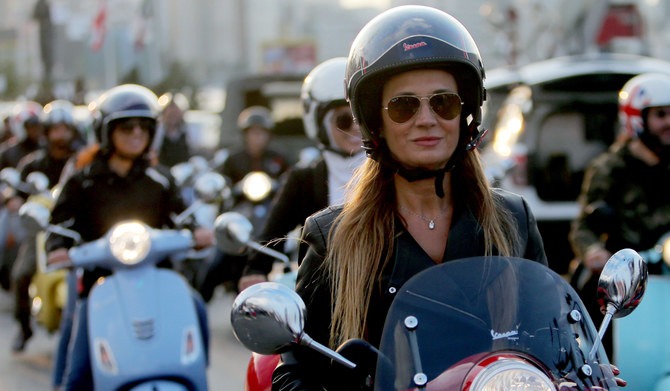As Lebanon’s economic crisis continues to take a toll on people’s finances, thousands of women in the country are turning to motorcycles as an affordable and efficient means of transport. The economic hardships have prompted many Lebanese to forgo driving cars and opt for motorcycles, with bike sales now accounting for approximately 50% of the consumer vehicle market. What was once considered a transportation option limited to young men, delivery workers, and university students has now evolved to include women in their 20s, 30s, and 40s skillfully navigating the country’s roads.Lebanon’s ongoing economic crisis has placed a tremendous burden on women, pushing some to explore traditionally male-dominated professions to secure an income. Many women have entered fields such as selling vegetables in pickup trucks, working in butcher shops, gas stations, car repairs, and even becoming taxi drivers. Women’s roles in the workforce have evolved over the years, particularly after Lebanon’s civil war, where women ventured into previously uncharted territories such as journalism, civil engineering, search and rescue, and frontline military positions.For Rasha Zamzami, 29, an engineer, learning to drive a motorcycle was a way to deal with the fuel crisis and avoid Beirut’s traffic jams. Although her family initially hesitated due to safety concerns, they soon recognized the importance of empowering women and accepted her decision. She and many other women have embraced motorcycling as a means of challenging societal norms and expressing their resilience and independence.As motorcycle ridership surges, Lebanon faces an increase in violations due to the majority of riders not wearing helmets and disregarding traffic laws. However, women motorcyclists often display a greater sense of caution on the roads, avoiding unnecessary risks and prioritizing safety. Despite the challenges, more women are choosing motorcycles, and the demand for bikes continues to grow.Enaam Halawi, 45, who co-owns a shop selling auto parts, learned to ride a motorcycle from her husband. Overcoming initial fears, she now confidently maneuvers her bike through the streets, cutting down travel time significantly. Rana Karzi, 40, was motivated to start riding motorcycles to avoid harassment while taking taxis. Today, she not only operates a motorcycle taxi service for women but also teaches others to ride.As more women embrace motorcycles, they are gaining the respect of fellow drivers, who now encourage and support their choice. Many have found the transition from timid riders to confident drivers empowering, with their motorcycles providing a sense of freedom and independence amidst challenging times.Lebanon’s economic crisis has undoubtedly been a catalyst for change, driving women to overcome social barriers and venture into new territories. The increase in motorcycle ownership and women riders has become a symbol of resilience and determination in the face of adversity. As they navigate the streets on two wheels, these women are defying stereotypes and inspiring others to be fearless in pursuing their dreams. Through their experiences and journeys, they are rewriting the narrative and proving that women in Lebanon are more than capable of taking the driver’s seat, both figuratively and literally.
Motorcycle Revolution: Lebanese Women Embrace Two-Wheeled Freedom Amid Economic Crisis













Wow, awesome blog layout! How lengthy have
you ever been running a blog for? you make running a blog look easy.
The overall look of your site is excellent, let alone the content material!
You can see similar: dobry sklep and here ecommerce
This is a great tip especially to those new to the blogosphere.
Simple but very accurate info… Many thanks for sharing this one.
A must read article! I saw similar here: najlepszy sklep and
also here: ecommerce
I enjoy what you guys are up too. This kind of clever work and reporting!
Keep up the great works guys I’ve added you guys to blogroll.
I saw similar here: Sklep online
Hi! Do you know if they make any plugins to help with Search Engine Optimization? I’m trying to get my blog to rank for some targeted keywords but
I’m not seeing very good success. If you know of any please share.
Thank you! You can read similar art here: Sklep online
It’s very interesting! If you need help, look here: ARA Agency